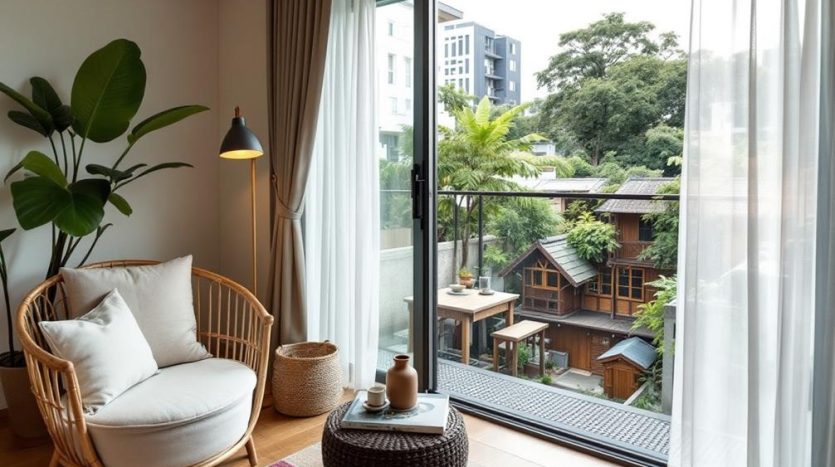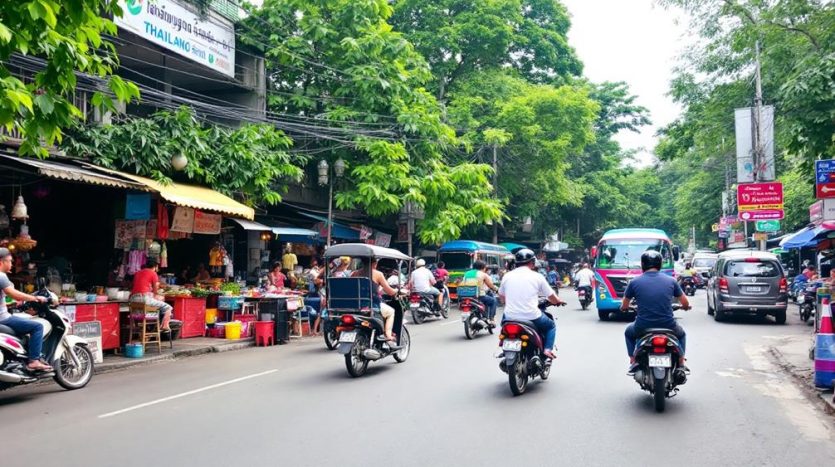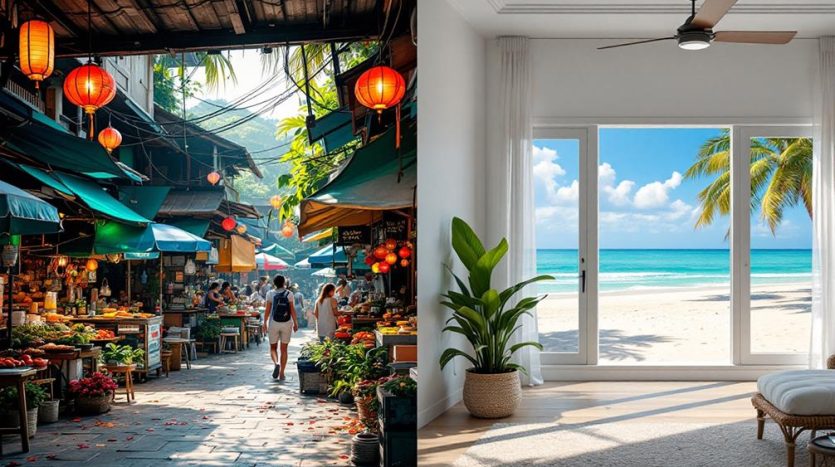Is $2000 a Month Enough to Live in Thailand?
You might think $2000 a month isn't sufficient to live well in Thailand, but you'd be surprised by how far it can stretch. With affordable housing, street food that doesn't strain your wallet, and cheap public transport, the essentials are covered. Healthcare is both accessible and budget-friendly, easing any worries about unforeseen medical expenses. However, it's not just about meeting basic needs—there's more to reflect upon. Can you maintain a lifestyle that includes leisure and savings? Let's explore the financial nuances that come with living in this diverse and vibrant country.
Key Takeaways
- With flexible rental agreements and low utility costs, housing expenses in Thailand can fit comfortably within a $2000 monthly budget.
- Affordable local markets and street food options make it easy to manage food costs on a $2000 budget.
- Public transit and ride-sharing services offer budget-friendly transportation, keeping travel expenses low within a $2000 budget.
- Quality healthcare services are accessible and cost-effective, with insurance plans ranging from $50 to $100 monthly.
- Engaging in cultural and recreational activities is inexpensive, allowing for a fulfilling lifestyle on a $2000 budget.
Cost of Housing
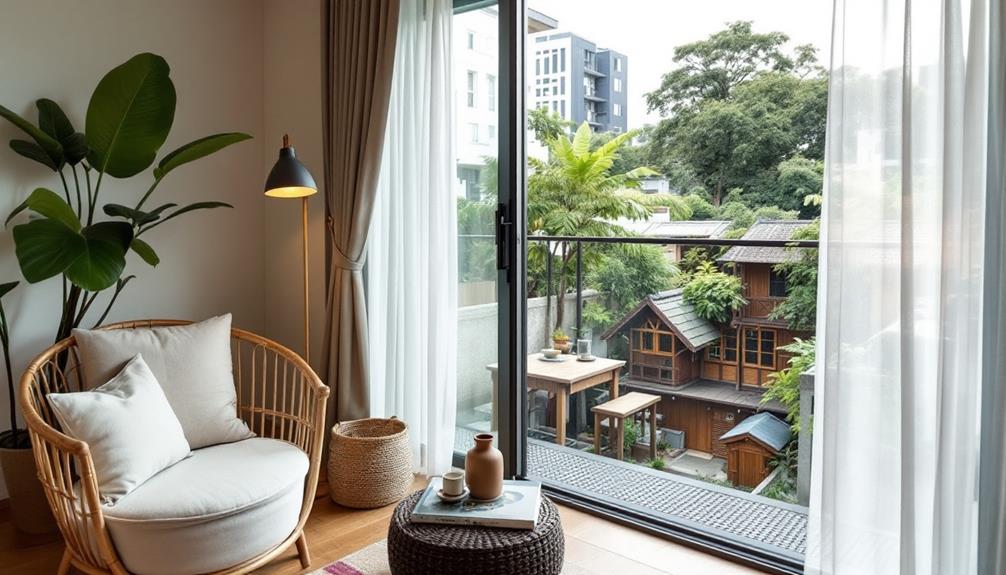
When considering the cost of housing in Thailand, you'll find a diverse range of options to suit various budgets and lifestyles. Imagine this: you could be lounging in a swanky Bangkok condo or chilling in a quaint Chiang Mai bungalow, all without breaking the bank.
Housing types range from high-rise apartments to charming Thai-style homes, offering something for everyone—even if you're just a humble retiree or a digital nomad with a penchant for pad thai. Depending on the location, such as the bustling city of Bangkok or the serene landscapes of rural Thailand, the cost can vary considerably, with urban areas often demanding higher prices due to amenities and demand.
Now, let's talk rental agreements. In Thailand, they're as flexible as a yoga instructor. You can snag short-term leases or commit to long-term stays, depending on how much you love mango sticky rice and tuk-tuks.
Just remember, negotiating rent is practically a national sport here, so bring your A-game.
And don't worry about utilities—electricity and water bills are usually low, unless you're running an ice-making factory in your living room.
But hey, who needs air conditioning when you've got a fan and a cold coconut?
Food and Dining Expenses
When planning your budget for living in Thailand, you'll find that food and dining expenses offer flexibility. Purchasing fresh produce and staples from local markets can be incredibly cost-effective, allowing you to enjoy nutritious meals without breaking the bank.
Additionally, the diverse street food scene provides affordable dining options if you wish to experience authentic Thai cuisine without overspending. In urban areas, meal pricing varies, offering numerous affordable options at street markets that cater to different budgets.
Local Market Costs
Exploring the vibrant local markets in Thailand reveals a culinary landscape that's both diverse and affordable, making it possible to dine well even on a modest budget.
Picture yourself maneuvering through rows of stalls, each one brimming with colorful produce and aromatic spices. The local market variety is astounding—fruits you've never seen before, veggies that look like they belong in a sci-fi movie, and seafood that practically leaps off the ice. You might even find yourself bartering over a bag of mangosteens like a seasoned pro, testing your newfound bargaining techniques with the vendors.
Beyond the fresh produce, local markets offer prepared foods that are both delicious and wallet-friendly. Grab a plate of pad thai or a skewer of grilled meats for just a couple of bucks.
Those savings add up, allowing you to stretch your $2,000-a-month budget further than you might imagine. And let's be honest—haggling over the price of a kilo of lychees might just be the most fun you'll have with your money.
Dining Out Budget
Dining out in Thailand can be a delightful experience that doesn't break the bank, especially if you know where to look. With a budget of $2000 a month, you can savor a variety of dining experiences that offer both quality and value. Thailand's local cuisine is renowned for its bold flavors and affordability.
Picture yourself in a cozy spot, relishing a bowl of tom yum or a plate of pad thai for just a few dollars. Your taste buds won't know what hit them, and neither will your wallet.
Eating like a local can greatly stretch your dining out budget. Many restaurants offer delicious meals at prices that would make your accountant smile.
Even mid-range dining experiences, where you can indulge in more refined settings, are surprisingly affordable compared to Western standards. Imagine enjoying a full-course dinner and still having enough left over to tip generously!
But beware: your inner gourmand might be tempted to splurge on those fancy rooftop bars with views as stunning as the bill.
Street Food Variety
Street-food culture in Thailand offers an unmatched culinary adventure that's both economical and diverse, perfect for maintaining your $2000 monthly budget. Imagine starting your day with a steaming bowl of jok (rice porridge) from a cheerful street vendor, costing less than your morning coffee back home. You won't just save money; you'll dive mouth-first into an array of local delicacies that would make your taste buds tango.
Navigating Thailand's street-food scene is like playing culinary bingo where every bite wins. From skewers of grilled satay to the spicy kick of som tam (papaya salad), each dish is a cultural embrace without the hefty price tag.
Street vendors are the unsung heroes here, serving up gourmet experiences for a fraction of the cost. You'll find yourself eating well without needing to trade your firstborn for a decent meal.
Budgeting for food in Thailand is as easy as pie—or should we say mango sticky rice? With street food delighting your palate and sparing your wallet, you'll have plenty left over for other indulgences, like that elephant-painting class you didn't know you needed.
Transportation Options
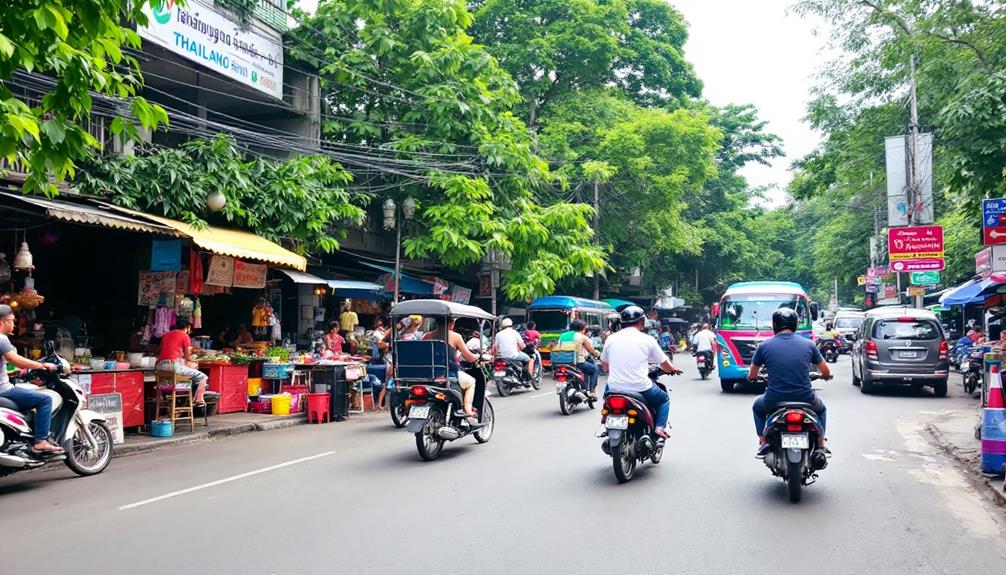
When considering transportation in Thailand, you'll find public transit both efficient and budget-friendly, ideal for keeping costs low.
Taxis offer convenience but can add up quickly, so it's wise to use them sparingly.
For those seeking flexibility and adventure, renting a scooter is an economical option that allows you to explore at your own pace.
Additionally, be mindful of potential utility costs such as fuel and maintenance when budgeting for transportation.
Public Transit Efficiency
Maneuvering Thailand's public transit system is often an efficient and cost-effective way to manage your transportation budget. With a blend of tuk-tuks, buses, and the BTS Skytrain, you might feel like you're in a live-action Mario Kart, but rest assured, public transit safety and accessibility are exceptional. You won't need to break the bank, or your back, trying to navigate the bustling streets of Bangkok or the serene landscapes of Chiang Mai.
Here's a quick snapshot of what you can expect:
| Transit Option | Average Cost | Key Features |
|---|---|---|
| BTS Skytrain | $1 – $2 | Fast, air-conditioned, scenic |
| Bus | $0.30 – $1 | Economical, varied routes |
| Tuk-tuk | $2 – $5 | Fun, negotiable fares |
| MRT Subway | $1 – $2 | Reliable, less crowded |
| Songthaew | $0.50 – $1 | Local, authentic experience |
You'll find the BTS Skytrain and MRT Subway are like the express lanes to your wallet's contentment, while buses and songthaews offer a more local, laid-back vibe. So, enjoy the ride, and remember, even if you get lost, it's just another adventure in your Thai odyssey.
Cost of Taxis
Although Thailand offers various cost-effective public transportation options, you might occasionally find the need for a taxi, especially for late-night returns or when convenience tops your priority list.
Don't fret; taxis here are generally budget-friendly. However, mastering taxi etiquette can make or break your ride. First, confirm the driver uses the meter. It's not just a fancy decoration; it's your ticket to a fair fare. Politely insist on it, or risk paying more than the cost of a 5-star meal.
Now, if you're the tech-savvy type, ride sharing apps like Grab can be your best friend. They provide transparent pricing upfront, so you won't be left guessing—or haggling—like it's a game show.
Plus, the convenience of hailing a ride from your phone might make you feel like a wizard who just summoned a chariot.
While taxis won't drain your $2000 budget, they're not free either. Use them wisely—like when you've overindulged in mango sticky rice and walking feels like a herculean task.
Renting a Scooter
Scooters, often seen buzzing through the bustling streets of Thailand, can be a cost-effective and exhilarating way to explore the country. Picture yourself weaving through traffic with the wind in your hair, avoiding the dreaded taxi fares. Renting a scooter not only puts you in the driver's seat but also saves you baht for more important things—like coconut ice cream.
Before you zoom off into the sunset, let's talk logistics. Renting a scooter ranges from $50 to $100 per month, depending on the model and rental duration. But beware! You'll need insurance coverage like a helmet needs a head. Make sure you're covered, as accidents happen faster than you can say "som tam."
Scooter maintenance is another critical factor. Keeping your ride in tip-top shape is essential—not just for your safety, but also your wallet. Regular check-ups and oil changes can prevent costly repairs and keep you cruising smoothly.
Ultimately, renting a scooter in Thailand can be a frugal choice, leaving you with more cash to enjoy the country's delights. Just remember to drive cautiously and keep your insurance handy!
Healthcare Costs
When evaluating healthcare costs in Thailand, how does the system fare for expatriates living on a $2000 monthly budget? Surprisingly well! Thailand offers quality medical services that are both affordable and accessible.
With health insurance in your toolkit, you can navigate the system without breaking a sweat or the bank. You can get health insurance plans tailored to your needs, covering everything from routine check-ups to those "I shouldn't have eaten that street food" moments.
Additionally, if you're a foreigner investing in property in Thailand, it's essential to reflect on financial obligations like local taxes and maintenance costs in your budget.
Now, let's talk numbers—because who doesn't love numbers? A basic health insurance plan can set you back around $50 to $100 a month. Not too shabby when you've got $2000 to work with!
Medical services in Thailand are renowned for their affordability. A visit to the doctor might cost you less than a fancy coffee back home.
And if you've ever wanted to be treated like royalty, Thai hospitals, with their excellent service, might just make you feel like you've hit the jackpot.
Entertainment and Leisure

Exploring entertainment and leisure options in Thailand can be both exciting and budget-friendly, fitting comfortably within a $2000 monthly budget. Picture yourself diving into vibrant cultural experiences, like visiting the Grand Palace or joining a local cooking class. These activities won't break the bank, and they'll leave you with stories more colorful than a tuk-tuk traffic jam.
When it comes to recreational activities, Thailand offers a smorgasbord of choices. Fancy a day at the beach? Head to Pattaya or Phuket, where you can soak up the sun without soaking up your savings. A round of golf on one of Thailand's lush courses is another way to enjoy the outdoors without feeling like you need to sell a kidney afterward.
For evening entertainment, Thailand's bustling night markets and street food scenes are must-visits. You can feast on delicacies while witnessing cultural performances, all for less than the cost of a New York City latte.
And if you're in the mood for something more electrifying, Bangkok's nightlife is world-renowned. Just remember to pace yourself; those $2 cocktails can add up quicker than a gecko on the run!
Savings and Emergencies
Allocating a portion of your $2000 monthly budget for savings and emergencies is essential to maintaining financial stability while living in Thailand.
Think of it as your financial safety net, ready to catch you when life decides to throw a curveball. With the vibrant markets and tantalizing street food, it's easy to get carried away, but establishing solid savings strategies is key. Aim to set aside at least 10-20% of your income each month for emergency funds.
This buffer will give you peace of mind, allowing you to savor that pad Thai without worrying about unforeseen expenses.
Thailand's low cost of living can work in your favor, making it easier to stash away some cash. Consider opening a local savings account to avoid foreign transaction fees, and remember to keep an eye on exchange rates.
You never know when a tuk-tuk might break down, or when you'll need a last-minute plane ticket home (or to escape that spicy food mishap).
Having a robust emergency fund means you can enjoy your Thai adventure without financial hiccups.
Just don't spend your savings on elephant rides—those memories are priceless, but your budget isn't!

